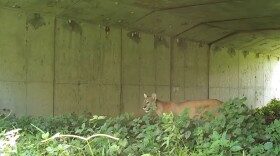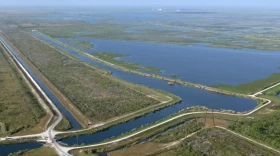By a narrow margin Tuesday night, a majority of the DeSoto County Commission voted to deny allowing biosolids sludge — the remains of human waste — to be brought into the county so it can be composted as fertilizer.
The vote was 3 to 2 to deny a special exception for the sludge plan.
For years this agricultural community was dubbed the Sludge Capital of Florida after unsuccessfully fending off attempts to stop the practice of allowing the sludge to be spread onto agricultural fields.
Biosolids are the treated remains from wastewater treatment facilities. Starting in the late 1990s, some 500,000 tons of Class B biosolids from 70 different treatment facilities across Florida were brought into DeSoto County annually.
In 2001, Molly Bowen and more than a dozen other residents were plaintiffs in a case against five ranchers and two sludge companies. The case was settled out of court in 2004 and the practice was stopped.
Bowen was one of several dozen members of the public who attended the public hearing Tuesday. She presented the Commissioners with some 250 signatures of people asking the Commissioners not to greenlight the business proposal.
"I'm just very relieved because we don't want to be the dumping ground of the Central Florida," she said. "What a relief. Really, I'm not surprised, but I'm just so relieved and very thankful that this is over with, with all the work we've put in it since last month, just getting the petitions together and working together with all my neighbors and my friends," Bowen said.
Related story
Harmful chemicals in sewage sludge that is spread on pastures as fertilizer have been known to cause cancer, the Environmental Protection Agency has said.
V.C. Hollingsworth, the son of one of the defendants in the original case, joined Osceola Organics of Clermont in asking the county for a special exception to allow Class B biosolids back into DeSoto County so that it could be mixed with yard debris and composted to a Double AA grade rated biosolid and be used as fertilizer.
WGCU is your trusted source for news and information in Southwest Florida. We are a nonprofit public service, and your support is more critical than ever. Keep public media strong and donate now. Thank you.







